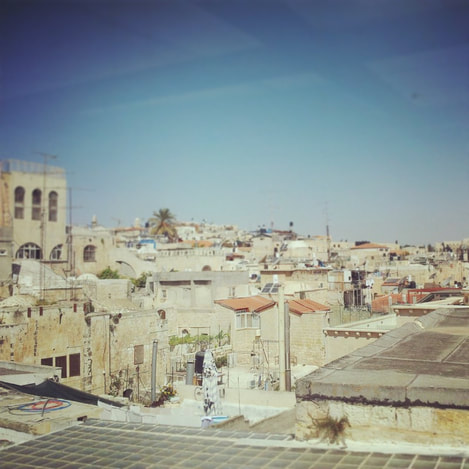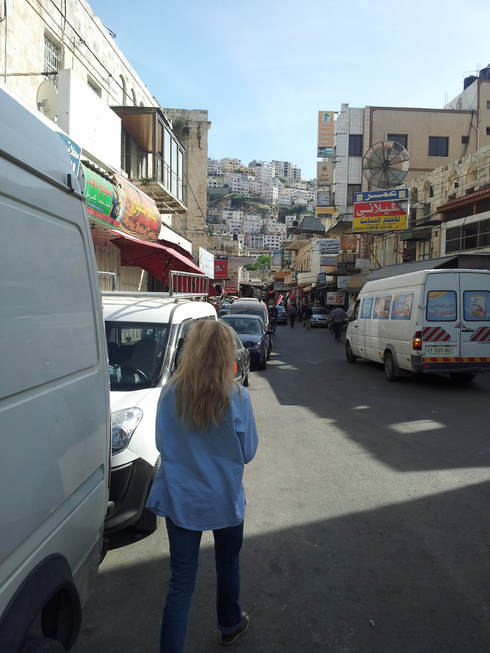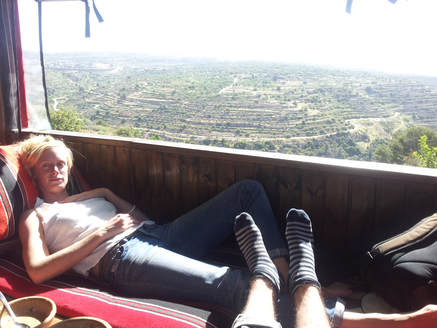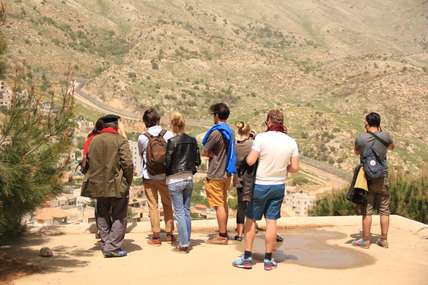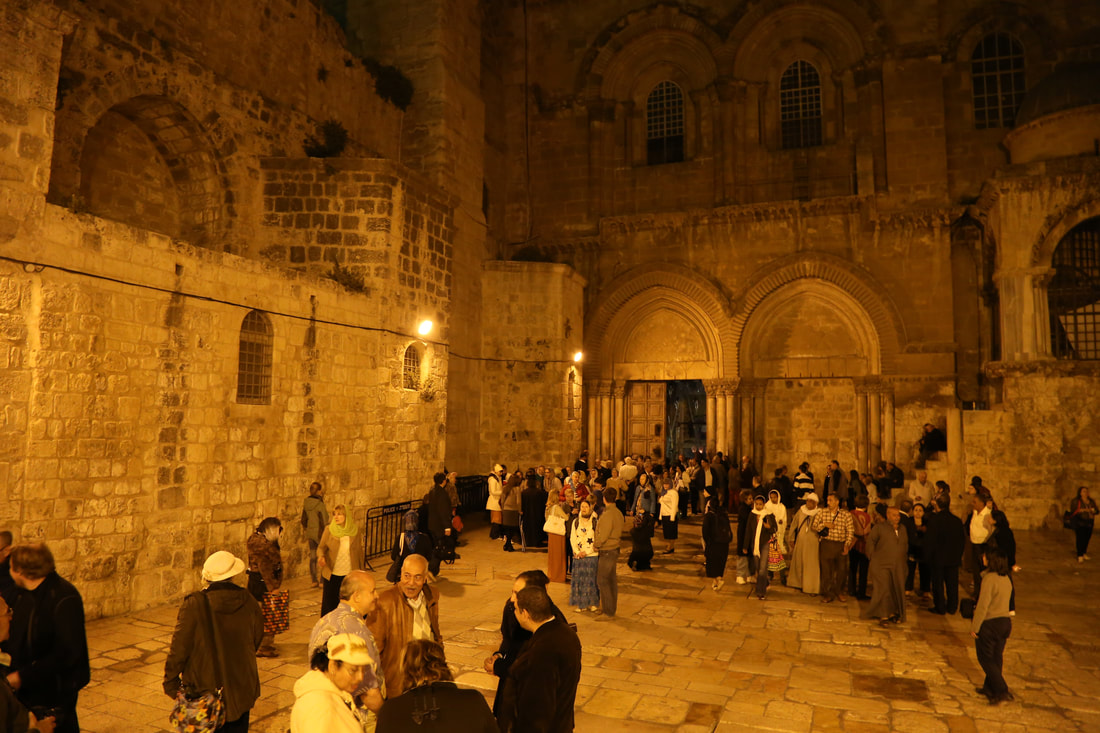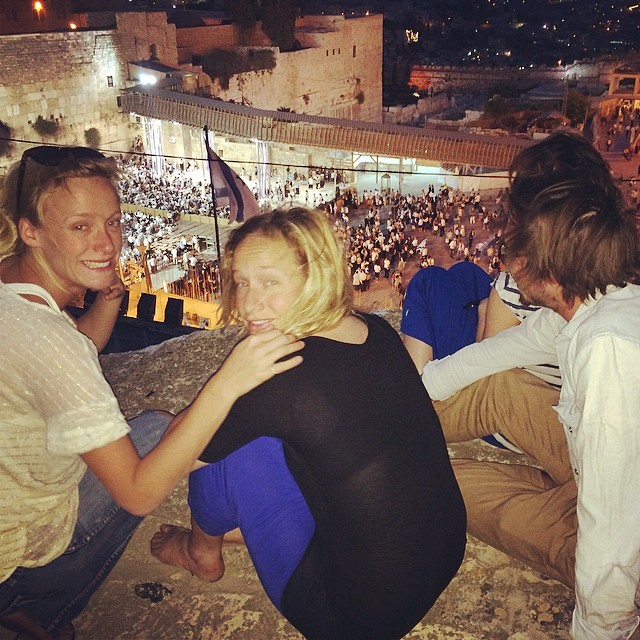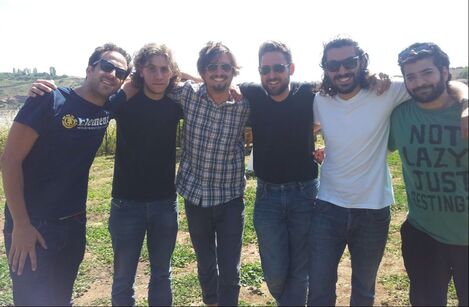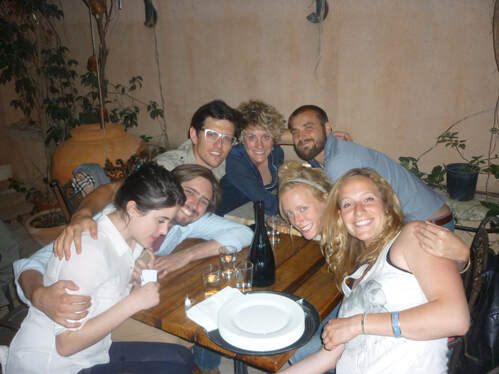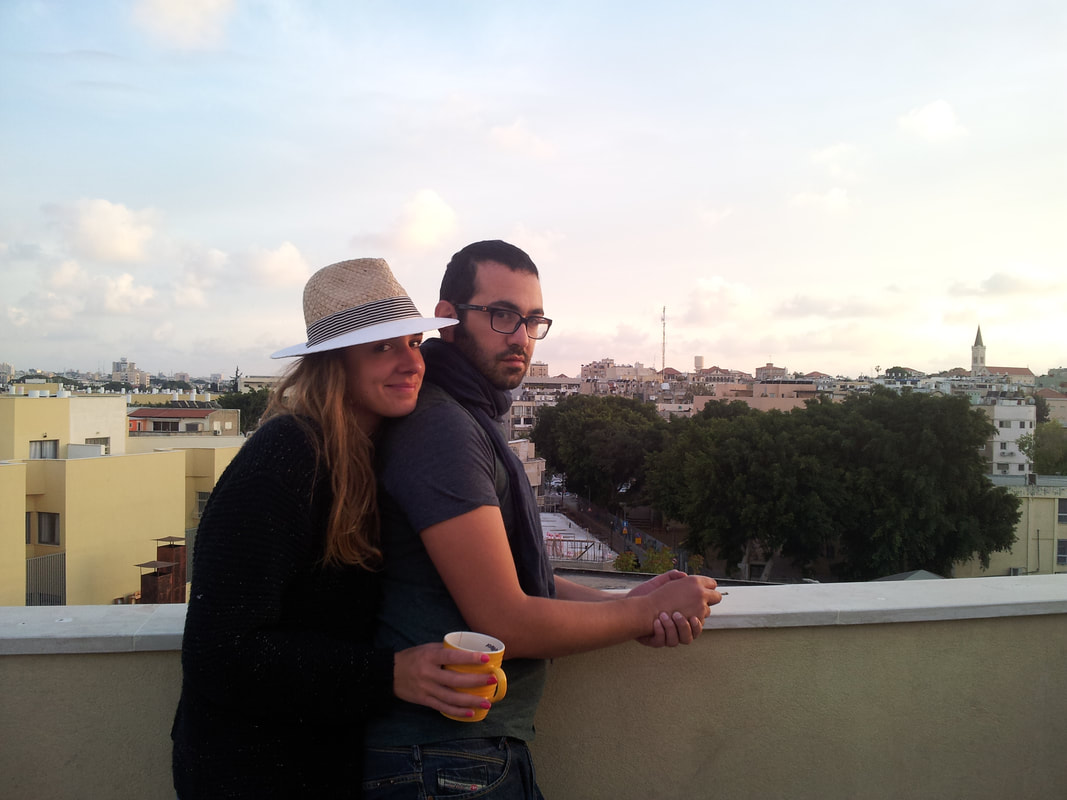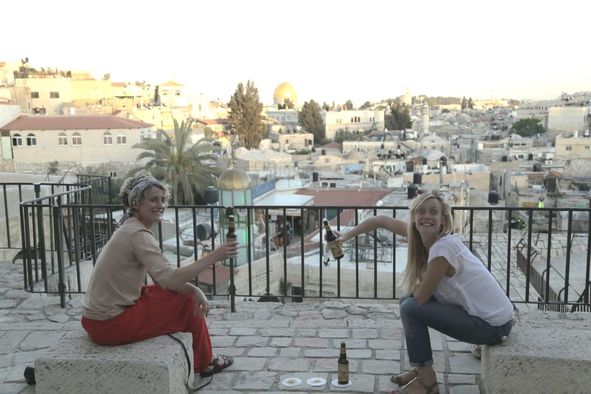Psi
Menu
II - PRODUCTION - THE LIVES
Chapter 5
Jerusalem: A Holy Fever Dream (May-July 2014)
Jerusalem: A Holy Fever Dream (May-July 2014)
|
After Helsinki, I flew back to Paris only for a few days to repack and then left to Jerusalem. I landed late at night, around 1pm, and took a sherout from Ben Gurion airport to Jerusalem. My meeting point with my friend Marie was at Jaffa Gate, one of the entry points into the Old City. As I entered, I noticed two big trucks being loaded with film equipment: lights, dollies, cables, etc. I had recently heard that Natalie Portman was shooting in Jerusalem her directorial debut, A Tale of Love and Darkness, and so I wondered if this could be her crew packing up. Before I had time to find out, my friend Marie came racing up from a dark alley and whisked me away through a maze of narrow streets. Her apartment was in the heart of the Old City, a stone’s throw from the Dome of the Rock and the Western Wall. Marie had set up a mattress in the small veranda at the back for me to stay, but as it was night, I didn’t pay much attention to what lay beyond the windows; all I could see were a collection of green neon lights here and there in the distance. The next morning, however, I was awoken to one the most striking sights I have ever experienced, overlooking the sun-soaked rooftops of the Old City from which echoed the wailing cries of Orthodox Jews in nearby yeshivas and the hypnotizing Adhan prayers of imams atop their minarets.
Intoxicating Old City
I have been a non-believer my whole life, but this place truly struck me with a taste of religious fever. The collective air of mysticism in which the whole city and population basked made it instantly intoxicating. Everything seemed to be moving in chaotic order. My first day there, I simply wandered through the Old City, getting lost between the different quarters. I felt an intriguing reverence to the buildings I passed by, knowing that every brick was steeped in centuries of religious history, political controversy and personal tragedy. While nighttime in the Old City was fresh, empty and silent, in the daytime it became a feverish trip: it was gorged with warm sunlight, filled with smells of bread, spices and cooking falafels, pulsating to competing Hebrew and Arabic beats, bustling with energy among the exhausting crisscrossing of religious tourists, orthodox Jews pacing head-down to prayer sites, cheeky Arab kids running around and riding bicycles, machine-gun-wielding IDF soldiers patrolling between check-points and merchants fearlessly pushing carts up and down stone stairs. While it was impossible to not be aware of the ongoing political conflict, it was bizarrely enthralling for an outsider like me to feel just how much this crazy microcosm was buzzing with tension.
I had originally planned to stay in Jerusalem for 3 weeks; but I was so fascinated with this place and the people I was meeting that I kept pushing my flight back and eventually, I ended up staying 3 months. This would not have been possible if I didn’t have a friend like Marie, a person gifted with endless energy and generosity, someone who not only encourages you to do things, but also enables you to do them. Every time my flight would be approaching, she’d yell: “Push it back! Stay here until the summer!” Dear reader, if you don’t already have a friend like that, get yourself one.
The great thing about being with her in Jerusalem was that she introduced me to so many people, both on the Israeli side and the Palestinian side, working in all kinds of different fields: journalism, diplomacy, UN, NGOs, health, construction, military, etc. It is through a friend of hers, an ICRC delegate, that we went to shoot with Bedouins in the West Bank.
My time in Jerusalem turned into so much more than just shooting a film; every day was like a master-class in the historical context of the region. While over the course of the three months, I came to understand the conflict so much more, I was no closer to forming a solid opinion about what solution I should feel supportive of. It was like the puzzle had just grown a thousand more pieces. This, in itself - the sheer complexity of the situation - was rather depressing. Every dinner we had with people who lived and worked there day-in day-out, would inevitably veer into arguing about the conflict, and, sure enough, just like most peace negotiations, agreements would be reached here and there before ultimately the whole thing would collapse and return to the status quo of initial disagreements and contradictions. Just in time for desert.
Discovering the West Bank
Marie often had to travel to the West Bank for work and during my stay I had the chance to go there quite often. What I found there was perhaps what struck me the most overall: the huge difference between my expectation, which relied on years of media coverage, and the reality. To me, words like “West bank” and “Cisjordanie” (the French word for West Bank) were associated with images taken from a post-apocalyptic movie, with a big concrete wall separating rich from poor, deadly militarized check-points, overcrowded refugee camps, and general war, destruction and misery. So before going for the first time, I must admit I was a little worried – and my relatives back home were too. All had some version of the similar warning: “The West Bank? Hum… Are you sure? Isn’t there a war going on? Don’t get on any buses… Be careful…” But when I questioned Marie on whether it was dangerous or not, she looked at me with a half-amused, half-disappointed smile, like a swimming instructor would look at a kid who’s asking if the pool is safe. And, while of course the consequences of the conflict are visible, I discovered that the West Bank is really a beautiful place – we wandered the market and had knafé in Nablus, enjoyed Taybeh beer in Ramallah, ate makloubé in Jericho and relaxed at the Hosh Jasmin organic farm-restaurant by Bethlehem.
|
|
I’m under no illusion that my experience there was cotton-wooled in the privilege of ignorance (having no pre-existing emotional ties in the conflict) and being a white tourist guided by a well-connected and fearless diplomat in a time of relative tranquility. I had by no means experienced the more regular and harsh life of the West Bank (not to mention Gaza, where I didn’t go), as we drove through many run-down areas, butterflying from safe place to safe place. But the simple fact that such a trip was possible and pleasurable was eye-opening to me. And when we met and hung out with Palestinians, the conflict was not a major topic of conversation - we'd talk about food, tourism, culture, travel. Pretty much the same as anywhere else I'd lived in the past, really. The conflict was something they had to deal with throughout their life, but on a day-to-day basis, in human interactions with people who aren't there for or because of the conflict, they went about life like any one else in Paris or LA.
Of course, there was undeniably a huge difference – not just culturally, but economically - between the Palestinian side and the Israeli side. This was no clearer than when driving through Ariel, one of the largest Israeli settlements cutting through the West Bank between Nablus and Jerusalem. Driving north to south, we first went through several old Palestinian villages, all in the bottom of valleys, before driving up the mountain to the gates of Ariel, and all of a sudden, we were in a different world, one that looked very much like the suburbs of an affluent American city. It was like being teleported, on the same road, from The Hurt Locker to The Truman Show. Arbitrary inequalities
Weirdly, I had felt a similar feeling when travelling through South America. After spending three weeks in Bolivia, sleeping in rural guest-houses, crossing paths with modest farmers, travelling in old 4x4 jeeps through the desert on dirt roads, we finally arrived at the border crossing to Chile, high in the southern mountains. On the other side of a comically isolated road barrier, we climbed into an air-conditioned coach and were on our way down an immaculately asphalted road to San Pedro de Atacama; later, on our way to Santiago, we discovered a country that was, at least to the naked eye, extraordinarily similar to California: big high-ways, big trucks and big malls with fast-food courts.
When I was studying ethics in London, my Human Values professor, philosopher Jonathan Glover, asked our class on the first day to reflect on who we were, and ask ourselves: what if we were born a woman/man, or what if we were born in China, or what if we were born in 1859? And what if, even, we were born a Chinese woman/man in 1859? The point of this discussion was for us to realize how much of our current selves – our mentality, our values, our prejudices, our ambitions, our rights, etc. – were, to a large and irreducible part, dependent on things that were out of our control and arbitrarily determined by how, where and when we were born. This was something that had long troubled me and still does, because the world is a patchwork of immense inequality and disagreement. And this is brought to the fore in places where extremes are in such close proximity, such as Chile/Bolivia and Israel/Palestine. Putting aside the history, the economics, the wars, the genuine claims that must be satisfied to reach a resolution and the efforts that beckon, it remains tragically unfair that a person’s chances for well-being are so radically different, depending on which side of a mountain or a wall they happen to be born on. And I did say chances for well-being, because of course, I’m not saying there are no happy Palestinians or Bolivians, or that there are no unhappy Israelis or Chileans. It’s a matter of equal opportunity to access the goods on which human well-being relies: security, health, education, and so on. And this seems like something that should cut through all the contingencies of past generations and be safely and equally available to all those who are brought into this world. Parents’ gripes shouldn’t determine their children’s strife. Of course, I count myself among the lucky ones. I was born in a peaceful country, with the 5th largest economy in the world, universal healthcare and free education. We all know about the insane statistics of wealth inequality, with the 1% richest reportedly owning half the world’s wealth. But what is less known, and came as a bit of a shock to me, is that, if I am to believe some such studies, my parents, who I wouldn’t ordinarily call “rich,” rank as members of the 10% wealthiest people in the world, given they have at least $61.000 to their name; in fact, given that my mother owns a house and an apartment, together possibly worth more than $500.000, she may even be part of the top 1% richest in the world. This to me (and to her too, I’m sure) sounds insane. Whether this is actually the case or not isn’t really the point. What matters is to realize that most of us evolve in a pool of people – with all our struggles, inequalities and injustices – that is not aware of its tiny proportion in relation to the greater ocean of humanity. We live in our own little universe, unaware of the unfathomable size of what and who exists beyond it, and therefore with a stunted ability to put our own situation into perspective. As a consequence, people like myself are surely not sufficiently sensitive to the tremendous amount of luck we are initially endowed with to start off in life, given the odds of being born at a different and less privileged place (or time). This is worrying, because a greater awareness of such initial good fortune would be, according to Barry Schwartz, an extremely beneficial thing, psychologically speaking. He calls for being more “thankful” for what we have, identifying “downward counterfactuals” (i.e. thinking of how our situation could be worse) as a potent source of everyday satisfaction and a weapon to counteract the more common and easily indulged “upward counterfactuals” (i.e. thinking of how our situation could be better) which causes much self-doubt, dissatisfaction and regret. Religion vs free will
Part of our “initial endowment,” of course, extends to what type of society we are born in, and what kind of parents we have. I was made to think about this a lot more in Jerusalem, given the overwhelming presence of one religion or another. If you are born in a religious family, you will be inevitably determined by this belief to some degree and if at some point in life you are to detach from it, it will require tremendous amounts of strength and sacrifice. Religious affiliation is one of those “cards” that you are dealt at birth and over which you have little control. I didn’t decide to be born to non-religious parents. The reason, however, I find this card to be of special interest in the whole deck of initial endowments, is that it directly affects one’s perception of the world, of oneself, and, in particular, one’s own sense of control over one’s own life. I have always been fascinated and a little puzzled by how people can commit their life to religion (or rather, how people can find themselves committed to religion). This is pushed to the extreme in some cases, whether it is orthodox Jews, fundamentalist Islamists or evangelical Christians. All three live “by the book” and in a sense have voluntarily given up, or subjected, or devoted their free will to an external, higher will. I’m aware of course that the vulnerability to and devotion for religion can be multiplied by many factors in a tense and painful conflict situation. Yet, the fact remained that Jerusalem had three major groups of people following differing sets of rules – but all like clockwork, as though the same watch had three different mechanisms, each running on a different time.
Free will has always been an important theme in religion, because this concept is a perfect vessel to legitimize moral responsibility and to signal the presence of a soul. Yet, not only does the concept of free will give rise to an inherent paradox in the context of an all-controlling deity, but in a practical sense, religions, by their very nature, rob their followers of any useful sense of free will by imposing the adherence to a corpus of beliefs, the observance of a set of practices and the subjugation to a higher will. How is a person’s will to be free if it is constantly obeying commands? This is a problem I have never quite been able to resolve despite the best attempts of my religious friends. Instead, they argue that they are precisely making use of their will by following these rules every day. In fact, according to them, there is no higher act of will than to choose to have faith and follow their particular creed.
Every time I hear this, I don’t know how much of it I can accept, because it always sounds to me like a clever wiggle away from a serious challenge. I can see how it may be liberating to willingly follow certain restrictive rules; living freely requires making choices, which is a lot of work. It implies thinking about reasons and consequences and requires taking responsibility for a decision, under the threat of (human) punishment or regret. Following (divine) rules without questioning them, in other words giving up (even willingly) the exercise of one’s own practical free will in the conduct of daily life, could be a way of simplifying one’s mental workload by subtracting oneself from the need to think about certain decisions. This is what Barry Schwartz calls “second order decision” – religion gives you a set of rules that you follow automatically, thus freeing your mind to focus on other things. And, at face value, this is fine. In more secular scenes, actually, many people do this very same thing to good effect. Successful businessmen such as Steve Jobs or Mark Zuckerberg have been known to stick to one outfit so that their brains are free from the need to think about something as trivial as what clothes to wear, liberating those particular brain cells so that they can be dedicated to more consequential matters. Even President Obama remarked: “You’ll see I wear only grey or blue suits. Because I have too many other decisions to make. You need to focus your decision-making energy. You can’t be going through the day distracted by trivia.” So in principle, I can understand the usefulness of religion in this regard, but it is hardly the main reason believers give for why they practice their particular habits. And in a way, this points to the main epistemological grief I have with religion: what are the reasons behind each belief and behavioral choice they claim to settle? For instance, a common rule for Jews and Muslims is “No pork.” To which I automatically think: fine, but why? Sure, your mind is free from ever having to ponder “Should I eat pork or X,” but there are hardly any good sanitary reasons nowadays to not eat pork. That’s not to say there aren’t any good reasons not to eat pork; if the religious rationale was more in tune with ethical claims about animal welfare or environmental protection, then I would have great sympathy for the aversion to pork, but then consistency would require going all the way and becoming fully vegan (which is something I am completely conflicted about, because my culture and culinary preferences clash with my ethical reasoning, leaving me in a rather unsavory position). I’m aware of course that I’m arguing myself into a corner here because faith is by definition believing something without evidence, and therefore religious following doesn’t rest on the reasons behind each belief and practice, but rather on the whole experience and all subsequent benefits, such as having an answer to existential questions or the sense of belonging to a community. While I am deeply suspicious of the disdain, combativeness and lack of compassion shown by some of the most ardent atheists towards believers, I stand by my reliance on reasons, because they are truly what matters most. “Why?” is a question we should all continuously ask about everything, including the answers we are offered in return. After all, we are all naturally endowed with this desire for justification: just think of kids who will naturally keep on questioning adults with endless curiosity and skepticism, asking “but why?” to every one of their explanations until they are met with an exhausted "Because I said so!". While this may be annoying for the explainer, it is the healthy indication that we as a species are configured to question the world and to then only buy an explanation that we worked for and earned, not one that was forced upon us or given for free. |
|
When I look back on my time in Jerusalem, I’m amazed at how quickly you can establish a life somewhere. In only three months, I already had a stronger unit of friends and contacts – from Tel Aviv, to Jerusalem, to Ramallah - than I did in Paris. I could easily have continued living there. But my “real life” was calling and, somewhat sadly, I learned that soon after, most of that group of people in Jerusalem also departed, with their contracts ending and getting jobs elsewhere. I was saying earlier in this journal that films are like small lives one could safely live and explore, well, on the flipside, some episodes in life can truly feel like a film. They start, build, develop, climax and end just as quickly. Sadly, unlike movies, you can’t rewind and experience them again.
|
